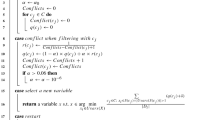Abstract
We present a new heuristic approach for maximal constraint satisfaction of overconstrained problems (MAX-CSP). This approach is based on a formulation of CSP as an optimization problem presented in a previous paper [Meseguer and Larrosa, 95], which has given good results on some classes of solvable CSP. For MAX-CSP, we have developed two heuristics for dynamic variable and value ordering, called highest weight and lowest support respectively, to be used inside the extended forward checking algorithm (P-EFC3). These heuristics are expensive to compute, so we have developed an incremental updating formula to avoid redundant computation. We have tested both heuristics with the P-EFC3 algorithm on several instances of two classes of random CSP. Experimental results show that both heuristics outperform previously used heuristics based on inconsistency counts. In fact, the lowest support heuristic appears as a kind of generalization of these previous heuristics, including extra information about future variables.
This research has been supported by the Spanish CICYT under the project #TAP93-0451.
Preview
Unable to display preview. Download preview PDF.
Similar content being viewed by others
References
Bakker R., Dikker F., Tempelman F. and Wognum P. (1993). Diagnosing and solving overdetermined constraint satisfaction problems, Proceedings of IJCAI-93, 276–281.
Feldman R. and Golumbic M. C. (1990). Optimization algorithms for student scheduling via constraint satisfiability, Computer Journal, vol. 33, 356–364.
Fox M. (1987). Constraint-directed Search: A Case Study on Jop-Shop Scheduling. Morgan-Kauffman.
Freuder E. C. and Wallace R. J. (1992). Partial constraint satisfaction, Artificial Intelligence, 58:21–70.
Horst R. and Tuy H. (1993). Global Optimization (2 edition), Springer-Verlag.
Hummel R. A. and Zucker S. W. (1983). On the Foundations of Relaxation Labeling Processes, IEEE Trans. Pattern Analysis Machine Intelligence, vol. 5, no. 3, 267–287.
Meseguer P. and Larrosa J. (1995). Constraint Satisfaction as Global Optimization, Proceeedings of IJCAI-95, in press.
Prosser P. (1994). Binary constraint satisfaction problems: some are harder than others, Proceedings of ECAI-94, 95–99.
Rosenfeld A., Hummel R. and Zucker S. (1976). Scene Labeling by Relaxation Operators, IEEE Trans. Systems, Man, Cybernetics, vol. 6, no. 6, 420–433.
Sastry P. S. and Thathachar M. A. L. (1994). Analysis of Stochastic Automata Algorithm for Relaxation Labeling, IEEE Trans. Pattern Analysis Machine Intelligence, vol. 16, no. 5, 538–543.
Wallace R. J. and Freuder E. C. (1993). Conjunctive width heuristics for maximal constraint satisfaction, Proceedings of AAAI-93, 762–778.
Wallace R. J. (1994).Directed Arc Consistency Preprocessing as a Strategy for Maximal Constraint Satisfaction, ECAI94 Workshop on Constraint Processing, M. Meyer editor, 69–77.
Author information
Authors and Affiliations
Corresponding author
Editor information
Rights and permissions
Copyright information
© 1995 Springer-Verlag Berlin Heidelberg
About this paper
Cite this paper
Larrosa, J., Meseguer, P. (1995). Optimization-based heuristics for maximal constraint satisfaction. In: Montanari, U., Rossi, F. (eds) Principles and Practice of Constraint Programming — CP '95. CP 1995. Lecture Notes in Computer Science, vol 976. Springer, Berlin, Heidelberg. https://doi.org/10.1007/3-540-60299-2_7
Download citation
DOI: https://doi.org/10.1007/3-540-60299-2_7
Published:
Publisher Name: Springer, Berlin, Heidelberg
Print ISBN: 978-3-540-60299-6
Online ISBN: 978-3-540-44788-7
eBook Packages: Springer Book Archive




